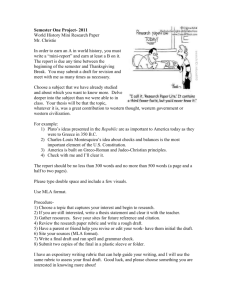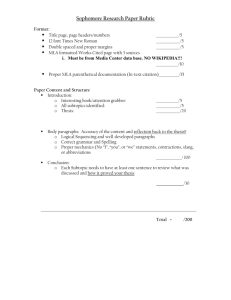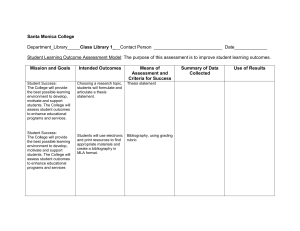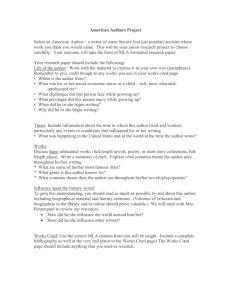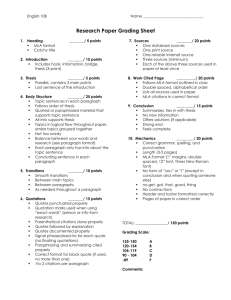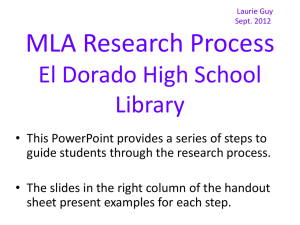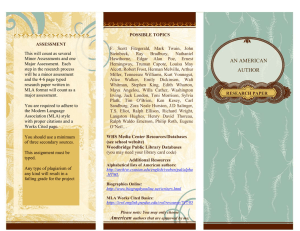World Literature Portfolio Project
advertisement
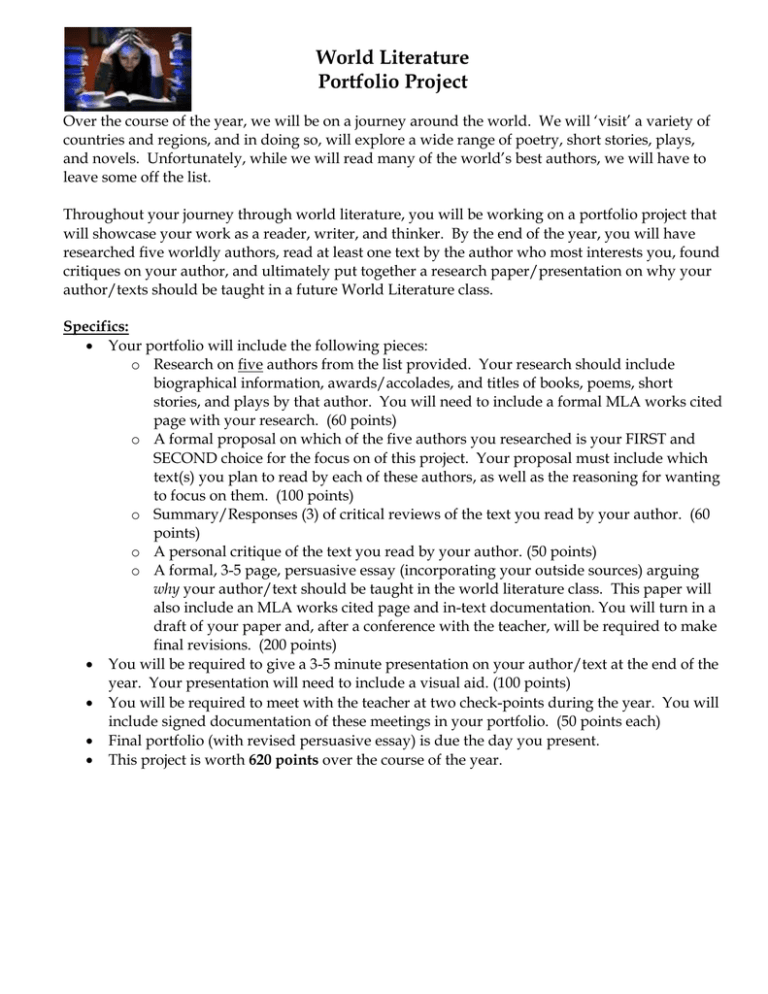
World Literature Portfolio Project Over the course of the year, we will be on a journey around the world. We will ‘visit’ a variety of countries and regions, and in doing so, will explore a wide range of poetry, short stories, plays, and novels. Unfortunately, while we will read many of the world’s best authors, we will have to leave some off the list. Throughout your journey through world literature, you will be working on a portfolio project that will showcase your work as a reader, writer, and thinker. By the end of the year, you will have researched five worldly authors, read at least one text by the author who most interests you, found critiques on your author, and ultimately put together a research paper/presentation on why your author/texts should be taught in a future World Literature class. Specifics: Your portfolio will include the following pieces: o Research on five authors from the list provided. Your research should include biographical information, awards/accolades, and titles of books, poems, short stories, and plays by that author. You will need to include a formal MLA works cited page with your research. (60 points) o A formal proposal on which of the five authors you researched is your FIRST and SECOND choice for the focus on of this project. Your proposal must include which text(s) you plan to read by each of these authors, as well as the reasoning for wanting to focus on them. (100 points) o Summary/Responses (3) of critical reviews of the text you read by your author. (60 points) o A personal critique of the text you read by your author. (50 points) o A formal, 3-5 page, persuasive essay (incorporating your outside sources) arguing why your author/text should be taught in the world literature class. This paper will also include an MLA works cited page and in-text documentation. You will turn in a draft of your paper and, after a conference with the teacher, will be required to make final revisions. (200 points) You will be required to give a 3-5 minute presentation on your author/text at the end of the year. Your presentation will need to include a visual aid. (100 points) You will be required to meet with the teacher at two check-points during the year. You will include signed documentation of these meetings in your portfolio. (50 points each) Final portfolio (with revised persuasive essay) is due the day you present. This project is worth 620 points over the course of the year. Timeline: The dates listed are DEADLINES! There will be some in-class time to do research, read, and work on portfolio pieces, but please understand that you MUST do work outside of class to successfully meet all deadlines. DATE First week of school Thursday, October 15th Friday, October 30th Nov. 2nd-Nov 13th Friday, January 8th Friday, February 5th Friday, March 5th Friday, April 23rd April 26th-May 7th Friday, May 21st and Finals Period ACTIVITY Introduce portfolio project Research on five authors/MLA works cited page Formal Proposal on top two choices Conference with teacher on proposal Finish book by your author Summary/Responses (3) of critical reviews of the book you read Personal critique of the book you read Draft (3-5 pages) of persuasive essay Conference with teacher on essay and required revisions Presentations! Final Portfolios with all parts (including revised essay) are due. Note about final project presentations: You will sign-up for a presentation slot and are expected to be ready on that day. Just so there isn’t any misunderstanding…. If you are not ready to go on the day you are supposed to present, you will receive a ZERO for the presentation. If you have an unexcused absence on the day you are supposed to present you will receive a ZERO for the presentation. If you do not show up for the final exam period (even if you presented earlier), you will receive a ZERO for the presentation. If you have an excused absence on the final exam period, you are required to come in on a make-up period or you will receive a ZERO for the presentation. Per FCHS policy: all students are to sit through the final exam period regardless of completing aspects of a final project earlier. WORLD AUTHORS (PLEASE PICK FROM THIS LIST) 1. 2. 3. 4. 5. 6. 7. Albert Camus (Algeria) Naguib Mahfouz (Egypt) Ngugi wa Thiong’o (Kenya) Chinua Achebe (Nigeria) Buchi Emecheta (Nigeria) Andre Brink (South Africa) Nadine Gordimer (South Africa) 8. Jin Ha (China) 9. Anita Desai (India) 10. Kamala Markandaya (India) 11. Rohinton Mistry (India) 12. R.K. Narayan (India) 13. Salman Rushdie (India) 14. Khaled Hosseini (Afghanistan) 15. Yukio Mishima (Japan) 16. Haruki Murakami (Japan) 17. Sook Nyul Choi (Korea) 18. Michael Ondaatje (Sri Lanka) 19. Bandula Chandraratna (Sri Lanka) 20. Janet Turner Hospital (Australia) 21. Alexandre Dumas (France) 22. Victor Hugo (France) 23. Franz Kafka (Germany) 24. Erich Remarque (Germany) 25. James Joyce (Ireland) 26. Oscar Wilde (Ireland) 27. Anita Lobel (Poland) 28. Elie Wiesel (Romania) 29. Fyodor Dostoyevsky (Russia) 30. Anton Chekhov (Russia) 31. Ayn Rand (Russia) 32. Aleksandr Solzhenitsyn (Russia) 33. Miguel Cervantes (Spain) 34. Orhan Pamuk (Turkey) 35. Paulo Coelho (Brazil) 36. Austin C. Clarke (Canada) 37. Cecil Foster (Canada) 38. Dionne Brand (Caribbean) 39. Gabriel Garcia-Marquez (Colombia) 40. Orlando Patterson (Jamaica) 41. Isabel Allende (Mexico) 42. Laura Esquivel (Mexico) 43. V.S. Naipul (Trinidad) 44. Harold Sonny Ladoo (Trinidad) 45. Ian Fleming (England) 46. J.K. Rowling (England) 47. Rudyard Kipling (India) 48. Arthur Conan Doyle (England) 49. Alexander McCall Smith (Scottland) 50. Mulk Raj Anand (India) 51. Jorge Luis Borges (Argentina) 52. J. M. Coetzee (South Africa) 53. Carlos Fuentes (Mexico) 54. Pable Neruda (Chile) 55. Samuel Beckett (Ireland) 56. A. A. Milne (English) 57. Octavio Paz (Mexico) 58. Buchi Emecheta (Nigeria) 59. Athol Fugard (South Africa) 60. Margaret Atwood (Canada) 61. Alice Munro (Canada) 62. Jerzy Kosinski (Poland) 63. Anzia Yezierska (Poland) 64. Choose Your Own (needs teacher approval) Brainstorming and Narrowing Assignment and Rubric for Final Portfolio Due Thursday, October 15th (60 points) List Five-Seven Authors whom you think may be interesting to research from the list provided or people who fit the following criteria: From a country outside the United States Writing about characters or events that occur outside the United States Authors Name Country Type of Literature Novel, Biography, Poetry, Graphic Novel Liked their Lit. √ Did not Like √ 1 2 3 4 5 6 7 ________________ ________________ ________________ Author Research on five authors from the list provided (Scan their biographies and works in Wikipedia or other sources) Your research should include biographical information. Awards/accolades, and titles of books, poems, short stories, and plays written by that author. Information about that author (awards, titles of books, biographical info) _________________ You will need to include a formal MLA works cited page with your research. Rubric and Assignment Sheet on Formal Proposal for Two Author Choices Due Friday, October 30th (100 points) A formal proposal on which of the five authors you researched is your FIRST and SECOND choice for the focus on of this project. Your proposal must include which text(s) you plan to read by each of these authors, as well as the reasoning for wanting to focus on them. Grading Rubric Author Proposal Score _______ OVERALL IMPRESSION: Demonstrates excellent writing skills Demonstrates good writing skills Demonstrates adequate writing skills Demonstrated fair writing skills FOCUS: Very clear and insightful Clear and interesting Evident but vague or too broad Unclear, some confusion Clear and logical Clear Not clearly related to the thesis Specific, ample, and relevant Thin and/or too general Thin or missing Order not completely logical Lack of order affects reading Random organization Sets main idea Starts slowly or abruptly Sets wrong expectations Gives information about the two authors and their work Summarizes their work but does not give an opinion Only names two authors Body Paragraphs Topic Clearly connected to thesis Sentences: Transitions: Aid flow and Connected to thesis Vague Missing Between and within paragraphs coherence Aid coherence Rough spots Unconnected ideas Concluding Sentences: Clearly connected to thesis Connected to thesis Vague Missing Conclusion: Restates main idea and adds insight Restates main idea Attempts to restate; may add new information Missing or changes direction VOICE: Rich, makes the reader relate and subtly shows audience awareness Clear, appropriate Attempts audience awareness Inconsistent or missing Sentences: Effectively engaging, varied Varied and interesting; easily read Clear but with little variation in length or style or beginnings Repetitious, stiff, confusing, or empty Word choice: Effective, precise, varied, not overwritten Appropriate, clear, effective Occasionally interesting and effective Wordy, wrong usage, unclear, diction errors Mechanics: Error free Few distracting errors Some distracting errors, but meaning still clear Distracting errors interfere with meaning DEVELOPMENT: Ideas: Details: Original and thought provoking Thoroughly developed, specific, rich, and relevant. ORGANIZATION: Overall: Introduction: Thesis Order of paragraphs logical One paragraph summary of each author’s work Tells what is interesting to the student about these two authors work and their importance in World Literature STYLE: Frequent errors you need to proof carefully for in the future RO- run on other___________ SVA-subject/verb agreement SF- sentence frag CS-comma splice its/it’s there/their/they’re there is you get Friday, February 5th Summary/Responses (3) of critical reviews (60 points) Guidelines Using the online card catalogue as well as other internet resources, search for the three most meaningful critical essays regarding the book you have now finished reading. Browse a handful of available essays in order to find the most poignant and significant. Finding essays with varying points of view will also lend more flavor to your reading and responses. Once you have found three important, critical essays, summarize the main points of each essay and then respond to those with your opinions / reactions. Title of Article #1 _______________________________________________________________ Author #1 ______________________________________________________________________ Rubric (20 points each) 60 points total __________ One paragraph summary mentions the three main points the author is making about the text the opinion the author expresses about the text and why gives examples from the text and cites those examples/quotations in MLA style __________ One paragraph response gives your opinion of the critics views supports your opinion of the critic with examples quotations are cited according to MLA style Title of Article #2 _______________________________________________________________ Author #2 ______________________________________________________________________ Rubric (20 points each) 60 points total __________ One paragraph summary mentions the three main points the author is making about the text the opinion the author expresses about the text and why gives examples from the text and cites those examples/quotations in MLA style __________ One paragraph response gives your opinion of the critics views supports your opinion of the critic with examples quotations are cited according to MLA style Title of Article #3 _______________________________________________________________ Author #3 ______________________________________________________________________ Rubric (20 points each) __________ One paragraph summary mentions the three main points the author is making about the text the opinion the author expresses about the text and why gives examples from the text and cites those examples/quotations in MLA style __________ One paragraph response gives your opinion of the critics views supports your opinion of the critic with examples quotations are cited according to MLA style Grading Rubric Student ________________________ Period _______ Final (200 pts.) Score ________ OVERALL IMPRESSION: Demonstrates excellent skills in writing and competence Demonstrates good skills in writing and competence Demonstrates adequate skills in writing and competence Demonstrated fair skills in writing and competence FOCUS/CLAIM: Very clear and insightful Clear and interesting Evident but fuzzy or too broad Unclear, some confusion Clear and logical Clear Not clearly related to the thesis Specific, ample, and relevant; uses limited variety of strategies DEVELOPMENT: Ideas: Original and thought provoking Thoroughly developed, specific, rich, and relevant. Uses a variety of strategies Incorporating Research as support Research is integrated; used as support of main ideas Some research is incorporated; may have one area without support; research may have questionable bias Unity: Clear and unified Minor unity breaks from thesis and/or within paragraphs Thin and/or too general; Uses only 1 or 2 strategies; largely opinion Lack of research affects objectivity & development OR too much reliance on research loses writer’s own voice OR clear bias affects argument outcome Thesis and/or paragraph breaks interfere Logical Fallacies: Avoided A couple 3 or more Too many; lose credibility Order not completely logical Lack of order affects reading Random organization Sets main idea Starts slowly or abruptly Sets wrong expectations Clearly connected to thesis Aid flow and coherence Between para. Within para. Connected to thesis Aid coherence Between para. Within para. Vague or misdirects Rough spots Between para. Within para. Missing Concluding Sentences: Clearly connects to thesis Connects to thesis Vague or uses citation Missing Conclusion: Restates main idea and adds insight Restates main idea Attempts to restate; may add new information Missing or changes direction Voice: Rich, makes the reader relate and subtly shows audience awareness Clear, appropriate Attempts audience awareness Inconsistent or missing; attacking Sentences: Effectively engaging, varied Varied and interesting; easily read Word choice: Effective, precise, varied, not overwritten Appropriate, clear, effective Mechanics: Error free Few distracting errors Clear but with little variation in length or style or beginnings Occasionally interesting and effective Some distracting errors, but meaning still clear Repetitious, stiff, confusing, or empty Wordy, wrong usage, unclear, diction errors Distracting errors interfere with meaning Follows MLA format without any errors Follows MLA format without any errors Some errors, but the main format is clear Major format errors Missing Few formatting errors Inaccurate or incorrect Missing Support of personal position Thin or missing Missing Not unified - rambles ORGANIZATION: Overall Introduction: Body Paragraphs Topic Sentences: Transitions: Logical sequences of paragraphs Captures reader’s interests and sets main idea Unconnected ideas STYLE: Works Cited Page In-text Citations

